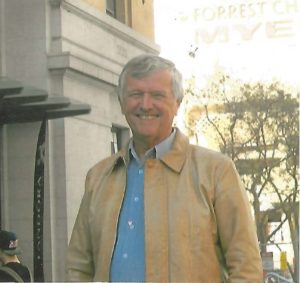Geoff’s Story

Father-to-two, grandfather-to-four and stuttering coach, Geoff, 73, Perth, began stuttering at three years of age.
What ensued was 53 years of trial and error with various speech-related techniques, and an unrelenting search to understand the disorder at its core.
Over time, Geoff, whose father also stuttered up until his early teens, learned to proficiently conceal his stutter, and to avoid situations that would require him to speak publicly.
In 2000, at age 56, Geoff discovered the McGuire Programme – a programme that encourages participants to confront their stutter, rather than avoid it and better manage their stutter with improved breathing techniques. By focusing on various breathing methods, building his confidence, and enrolling in Toastmasters (an organisation dedicated to improving public speaking), Geoff’s speech disorder improved significantly.
Now, 17 years later, Geoff speaks with very little hesitation and almost fluent speech. In addition to his busy schedule serving as a board member for four organisations, Geoff also takes time to coach others who stutter.
This is Geoff’s story.
“My stutter had a fairly unusual presentation. The majority of children begin stuttering around three-to-four years of age, as their speech begins to develop, and four-out-of-five children outgrow this form of stuttering. However, I fell into the category of children whose stutter did not resolve spontaneously,” said Geoff.
Geoff’s stutter became more frequent and prominent by the time he entered primary school.
“My stuttering became a real disability, which I quickly learned to hide by choosing not to talk. My teachers knew very little about stuttering back then. When I spoke, I was bullied and sneered at, so I chose to withdraw and refrain from talking unless absolutely necessary,” Geoff said.
Geoff’s stutter continued unabated, into adulthood.
“My stutter affected every aspect of my life. I met a woman, whom I later married, who was very supportive of my situation. By the time I hit my 40s, my confidence had grown significantly, although my stutter continued to linger at the back of my mind.
“I was always proactive in my approach to treating my stutter. I visited a number of healthcare professionals over the years before finding a treatment that worked for me,” said Geoff.
“Then at 56 years of age, I participated in a self-development programme that teaches improved breathing techniques and improved eye contact. This program also offered the participants coaching and support services, which I found most helpful.”
The self-described “covert stutterer” had trained himself to barely speak unless absolutely necessary, a behaviour which significantly compromised his self-confidence.
“A lack of self-confidence can cause significant fear and anxiety when facing a situation that requires you to speak. This situation particularly affects your breathing, and you have to muster a lot of guts and determination to get through it. I call it the ‘GND (guts and determination) factor’.
“Eventually, I chose to face my fears head-on, and to accept many challenges, such as acting as the best man at a friend’s wedding,” Geoff said.
To this day, Geoff continues to attend his local Toastmasters each fortnight, and utilises the speaking skills he has gained through this organisation to coach others who stutter.
Geoff is participating in the NHMRC Centre of Research Excellence for Speech and Language ‘Genetics of Stuttering Study’, which aims to identify the genetic contributions of stuttering. He hopes his contribution will make difference to those with lived experience of, or a genetic predisposition to the disorder.
“I’m confident stuttering has some type of genetic link, so any study that aims to unravel the cause of the disorder in order to help those who stutter, is a step in the right direction.
“When coaching people who stutter, I often ask whether or not they have other family members who stutter, and many do. So, this study will be of relevance to many members of our community who stutter,” said Geoff.
